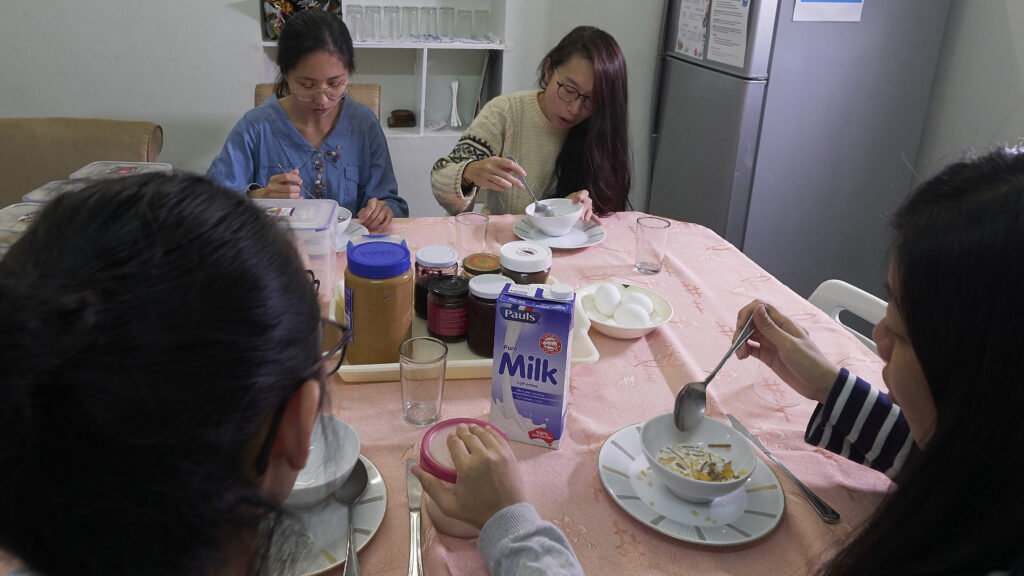Have you ever been in a conversation with someone in English when a few others stepped into the room, and all of the sudden the channel was switched to another language, and you no longer understood what was going on? You go from understanding everything and then nothing. Well, if you have taught English as a second language in another culture, I’d being willing to bet that you have. How did you feel? How did you respond to it?

It happens to me quite a bit. I think it’s a little bit like eating a meal with a person, but then others enter the room. I experienced this on Friday. The teachers entering the room brought their own “food” with them, and they start sharing “it” with the person I was talking with. The person I was talking with suddenly packed up what they were “eating” with me and started sharing with the teachers who just entered the room. Now I know this would be extremely rude, if we were talking about actual food. We are not, but I think the analogy comes close to reflecting the reality that many foreigners feel. By the way, just so you know, I am not offended. It’s okay. If this is happening to you and you feel offended you might want to check out the link below you can also drop me a message in the comments below.

Some local people are very sensitive to this matter of leaving a foreigner out of their conversation. They try to change the channel back to English or offer translation. I appreciate their efforts, but even when a person is very skilled at doing this, I still feel there is a gap. Why, because they are no longer enjoying the community meal. They are paying attention to my or some other foreigners needs and we are now eating a small separate meal together. No question about it, not having the dominate language separates you from others.

On Friday, I asked one of the teachers the meaning of one of the keywords that repeatedly appeared in their dialog. When she told me, I felt embarrassed. I know the word “typhoon” in Cantonese. Why had I missed it? I didn’t have any good answers. I just had to say okay while she gave some explanation to what they had just talked about. I know some of you might be saying, Ken you should be grateful. She included you. Yes, you’re right, I wasn’t left in the dark, but again it was like a separate “meal” that was prepared just for me that the others didn’t necessarily want to eat. A “meal” that I would have preferred to have avoided. Actually, in this case, one of the other teachers joined in and told me that I just needed to watch the news and I would know what was happening with the typhoon. Thankfully, her tone was neutral. I could tell she wasn’t looking down on me. Still, I am pretty sure this teacher misunderstood my intentions. She assumed that I was asking my question because I wanted information. No, I wasn’t looking for information. I was just looking to feel included and the very thing that I had hoped to avoid, interrupting their conversation, I had done. I’m guessing she probably felt a little bit annoyed, but that’s alright.

How will you play the cards that are in your hand. I am grateful for the relationships I have with the teachers at my school. I can connect with most of them one on one on a variety of topics. They like me and I like them, but I feel separate from them. Thankfully, this kind of language separation isn’t always a problem for me. My Cantonese is at a level where I am able to join some conversations in Cantonese. In fact, just last week, I contributed to the panel meeting at my school in Cantonese. For years now, our panel meetings have been conducted in Cantonese. The teachers feel more comfortable in Cantonese. I am okay with that. Thankfully, I understand a lot of what is being said and I try to ask questions of the person sitting next to me when I don’t. This was, however, the first time I share the S1-S3 exam results portion (a few minutes) in Cantonese. Everyone listened. No one said, “Good job or Bad job”. They just accepted what I had to share and we moved on. For a moment I was like them. The next day one of the teachers told me that he thought I had done a really good job. It was significant for me because I ate from the community dishes at the table and I also contributed making a dish as well.

If you are a Native English Teacher, working in a foreign country you have mixed bag of opportunities and challenges to navigate. Not speaking the local language is like having a disability, but that’s okay. It will mean that you have to be dependent on the local teachers in ways that the other teachers don’t have to. You are working with a team of teachers who can help you and you have a number of resources at your disposal. What do you think? Do you agree with me? Share your thoughts. I wish you the best.

